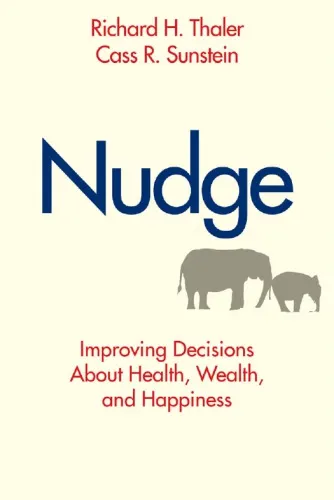Nudge: improving decisions using the architecture of choice
4.5
Reviews from our users

You Can Ask your questions from this book's AI after Login
Each download or ask from book AI costs 2 points. To earn more free points, please visit the Points Guide Page and complete some valuable actions.Introduction to "Nudge: Improving Decisions Using the Architecture of Choice"
Written by Cass R. Sunstein and Richard H. Thaler, "Nudge" is a groundbreaking exploration of behavioral economics, focusing on how subtle adjustments in the way choices are presented can significantly influence decision-making. Published in 2008, this book has become a seminal work in the fields of behavioral science and public policy.
Detailed Summary of the Book
"Nudge" reveals that individuals often make choices that deviate from their best interests due to cognitive biases and social influences. Sunstein and Thaler introduce the concept of 'choice architecture,' emphasizing how the organization of choices—the default options, framing effects, and presentation order—profoundly affects our decisions. The authors propose 'nudging' as a non-intrusive method to guide people towards better choices without restricting freedom of choice. They argue for 'libertarian paternalism,' a philosophy that endorses designing systems that foster welfare-enhancing options while allowing individuals to choose freely.
The book is filled with real-world examples and research findings, demonstrating how nudges can optimize outcomes in diverse areas such as healthcare, personal finance, and education. From defaults in organ donation systems to the strategic placement of food in cafeterias, these subtle changes in choice architecture can lead to significant improvements in individual and collective well-being.
Key Takeaways
- Choice architecture is pivotal in shaping decisions, often in non-obvious ways.
- Nudges can help overcome common cognitive biases like present bias and loss aversion.
- "Libertarian paternalism" advocates for guiding better decisions while preserving choice freedom.
- Implementing small changes in how choices are presented can lead to large positive impacts.
- Understanding human behavior can significantly enhance policy-making and personal decision-making strategies.
Famous Quotes from the Book
"The false assumption is that almost all people, almost all of the time, make choices that are in their best interest or at the very least are better than the choices someone else would make for them."
"By knowing how people think, we can make it easier for them to choose what is best for them, their families, and society."
Why This Book Matters
In an era overflowing with choices, "Nudge" offers invaluable insights into how small changes in choice design can lead to better decision-making outcomes. The book bridges the gap between psychology and economics, providing both a theoretical framework and practical tools for application in various fields, including business, public policy, and personal development. Its widespread influence is evident in governmental and business practices worldwide, as institutions adopt nudging tactics to promote healthier, smarter, and happier lives.
Nudge's importance also lies in its accessibility. It distills complex behavioral economic theories into clear, practical guidance, making it essential reading not just for policymakers and economists, but for anyone interested in understanding the subtleties of human decision-making and how to harness this understanding to foster positive change.
Free Direct Download
You Can Download this book after Login
Accessing books through legal platforms and public libraries not only supports the rights of authors and publishers but also contributes to the sustainability of reading culture. Before downloading, please take a moment to consider these options.
Find this book on other platforms:
WorldCat helps you find books in libraries worldwide.
See ratings, reviews, and discussions on Goodreads.
Find and buy rare or used books on AbeBooks.
1224
بازدید4.5
امتیاز50
نظر98%
رضایتReviews:
4.5
Based on 0 users review
"کیفیت چاپ عالی بود، خیلی راضیام"
Questions & Answers
Ask questions about this book or help others by answering
No questions yet. Be the first to ask!


